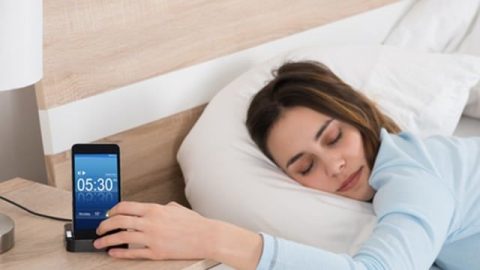Earbuds, headphones and earphones. These terms tend to be used interchangeably, when the truth is, they are not the same thing. Headphones, earbuds and earphones each mean something different. Nonetheless, they’re all used to listen to music or any other sound while being connected to a primary device either through wires or Bluetooth. Headphones are bands that go over your head and have padded speakers placed right over the ears. These are not the topic of discussion at the moment, though there are people who sleep with headphones in as well.
Earbuds are mostly wired to your device while you are listening while earphones are wrapped around your ear and are connected through Bluetooth as well as wires. Earbuds are cheaper and not as advanced as earphones are. They are better for light use, and still allow you to hear what’s going on around you. Since earbuds are a one-size-fits-all, they may not be a perfect fit in your ear.
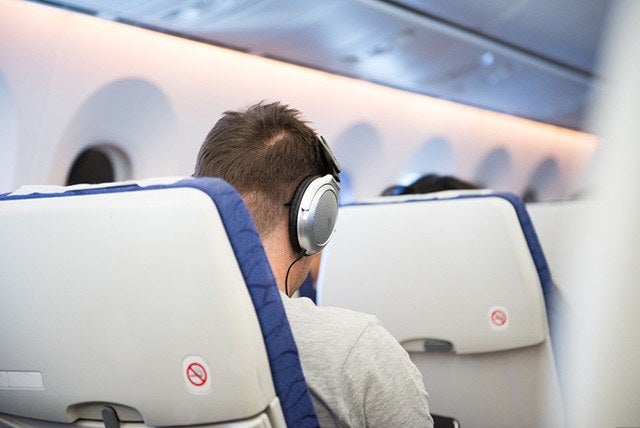
Why Do We Fall Asleep with Earbuds In?
Sleep doesn’t always come easy for everyone. There are lots of habits people develop to sleep better. Some people find solace in aromatherapy, having their room filled with pleasant scents and warm fumes from candlelight. Others find dim lights to be calm enough to lull forward sleep. A common almost everyone shares is the need for noise in the background. Sleeping in pin-drop silence can unnerve anyone who isn’t used to it, keeping your eyes open, mind alert, and ears listening. A solution for this is some sort of white noise (white noise will be discussed later in the article with greater depth).
The sound of the bustling city, the hum of a fan, the whirring of a humidifier, our mind gets used to all of these sounds at night which can actually help channel our sleep hormones faster. Since our brains work better on a schedule, hearing these sounds more prominently at night becomes part of our routine to go to sleep. But for some, these sounds cause a greater distraction than help, so we resort to sounds we like better; music.
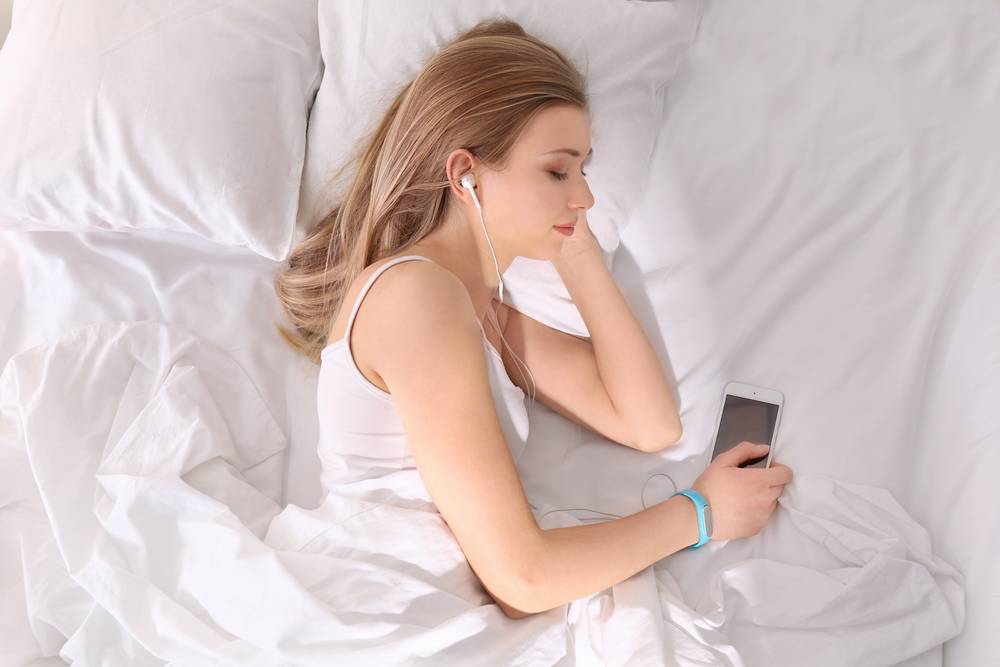
But music isn’t all people listen to at night. Some people fall asleep listening to twenty-four-hour podcasts, others fall asleep to soothing noises such as waterfalls or crackling fire. Whatever the sound you’re listening to, it ends up with you sleeping with your earbuds still in.
Does Music Help Us Sleep?
In truth, it completely can. We, as humans, have a natural tendency to enjoy listening to music. It’s the rhythm and melodies that sound good to us that we connect with and familiarize ourselves with. Music can calm down our heart rates and lower blood pressure. There is even a chance of our muscles relaxing. All of these reactions are exactly what our bodies do to prepare for sleep. Since music triggers these, it’s an ideal way to set yourself to sleep.
Music is a great alternative to sleep aids. In the long-run, sleep aids will cause more issues than they will provide solutions. Your body could get used to the sleep aids and therefore not react to them anymore. They can also make you more tolerant against the effect of medicines. Music comes at no cost (in most cases) and develops healthy sleep habits. Listening to music itself to put you to sleep comes with no negative effects. It’s how you listen to music that can cause complications.
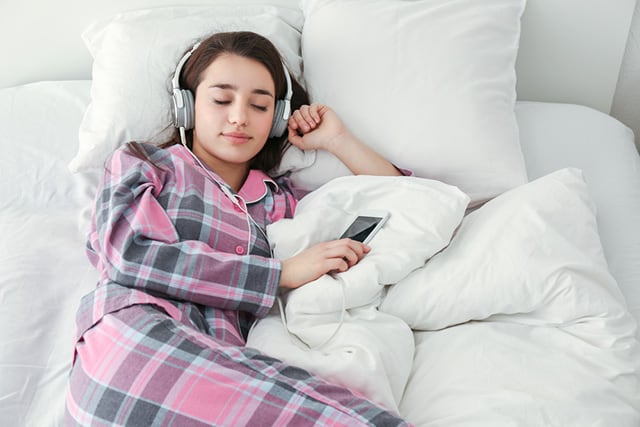
If slow music isn’t your forte however, you can always go back to your preferred taste in music. The familiarity and fondness towards any type of music will help wind you down while you listen. If your music taste is generally louder, then turn down the volume so you can still hear it, but not disturb anyone else. Try to get at least 45 minutes of music prior to sleeping so your body can properly shut down.
White Noise
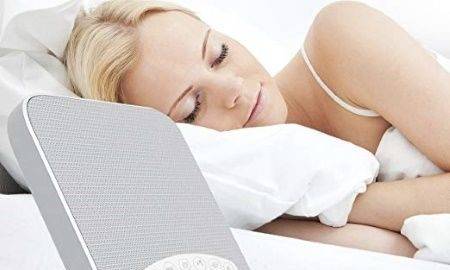
Since white noise is a bunch of tones playing at once, it’s used to mask out other sounds. This is why people can sleep easier at night when there is some white noise in the background. A multitude of sounds playing together can merge to become a white noise. But say a car alarm is going off outside. This is loud and significant. To drown out this noise, you would need something that creates various tones, like a fan or sound machine. That’s why some people sleep much better when there’s a fan on in the room.
Unfortunately, you can’t always have a fan, air conditioner or humidifier on in your room. This is where sound machines come into play. Sound machines are made for the very reason to create a soft sound that blocks out the rest of the world while you’re asleep. If you can’t get a sound machine, then you can always download white noise soundtracks on your phone. Make sure they don’t have a recognizable loop so as not to wake you up while you’re listening.
Sleeping with Earplugs Side Effects and Benefits
If you’re careful with how you sleep, yes, it’s safe for you to use headphones, earbuds or earphones while you are sleeping. The easiest device to sleep with however, are Bluetooth earphones. They do not have any trailing wires and they cuddle snugly around your ears. Earbuds are not so easy to keep in since they do not have a very secure hold in your ears. Headphones are bulky which could mean they create greater discomfort instead of a relaxing sensation.
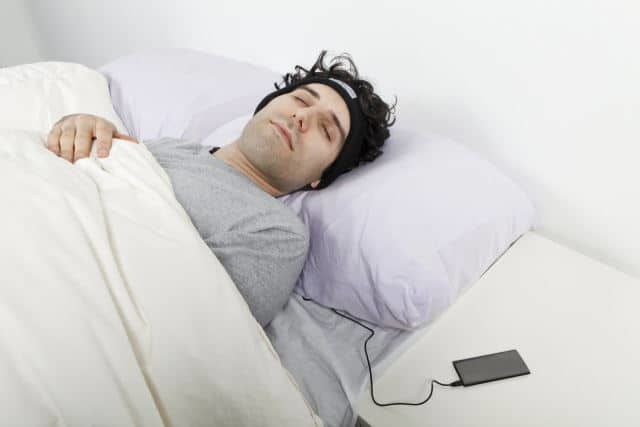
You have to be aware that there are consequences to sleeping with anything in or over your ears, just as there are benefits to it. In order to better caution yourself, it’s better to know. This will help you stay safe while you are sleeping, while also getting the night’s rest you need with soft symphony’s playing in the background.
You may want to read: Best Earplugs for Sleep
Consequences of Sleeping with Earbuds In
There are quite a few consequences you have to be aware of, most of which do not end nicely.
1. Build-up of Ear Wax
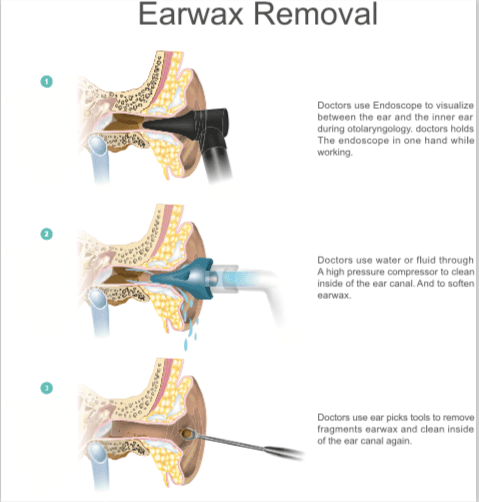
2. Otitis Externa
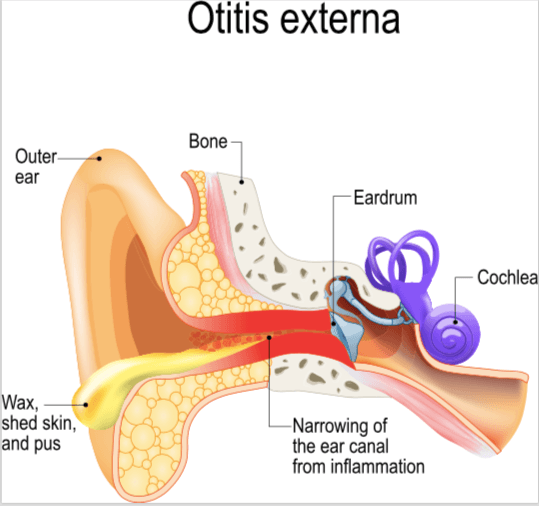
3. Hard of Hearing
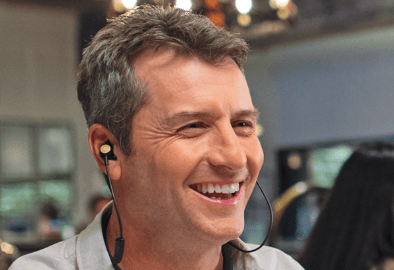
4. Necrosis
This condition is probably the most terrifying to come from your earbuds. If your earbuds are uncomfortable, they start to apply unnecessary pressure over your ear canal. When this happens, the skin can begin to wear out, and your tissues start to die off, killing your skin. This is necrosis, and it’s not a pleasant condition to have at all.
5. Other Noises
When you have earbuds in, you can’t hear much else around you. And if your music is too loud, you may miss hearing important sounds, such as a fire alarm going off in the middle of the night, a window breaking or a door opening when you’re not expecting any guests. Always keep your music low enough so that alarming noises can still wake you up.
Benefits of Sleeping with Earbuds In
1. Block Out Other Noises
Yes, this was originally placed down as a con, but if you use your headphones carefully enough, this is also the most prominent advantage. You can easily block out all other noises from your sleep with the help of music. You can listen to soothing sounds or music while ignoring noisy neighbors, rushing traffic, airplanes flying by, and even your snoring partner.
It will feel great to finally block out all of the madness that keeps you awake at night.
2. White Noise
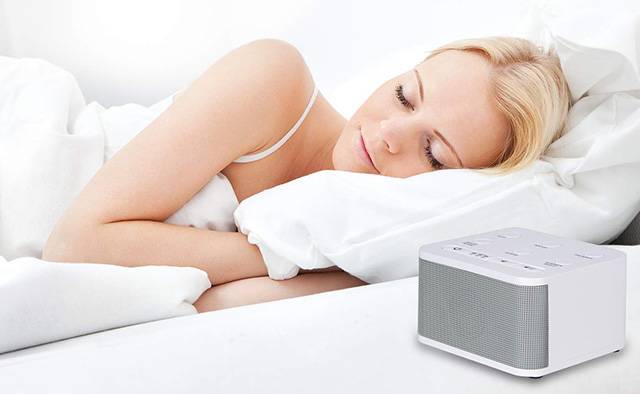
3. Insomnia, Depression, PTSD treatment

4. Stimulate Serotonin
Serotonin is a vital chemical our brain produces which helps everyone stay happy and relaxed. When you listen to music, you stimulate serotonin production. The happier you are, the less stressed your mind is and it becomes that much easier for you to go to sleep. Since you’re relaxed and in a pleasant mood, it will also be easier to stay asleep.
Precautions You Can Take When Sleeping with Earbuds
To make sure your sleeping habits with earbuds prove more positive than negative, there are a few precautions you can keep in mind. It’s better to stay cautious than endanger yourself.
- Make sure to listen to music at a very low volume. It should be even lower than the volume you would typically listen to in the morning. This will prevent any inner ear damage that can make you hard of hearing.
- Make sure to purchase earbuds or earphones that are a comfortable fit inside of your ears. If you can, stick with cushioned earbuds since these do not apply as much pressure as hard ones. There are foam and rubber cushions to make the impact softer when you push the earbuds in. If your earbuds refuse to fit properly and fall out too much, don’t bother with them at night. They might just fall out and cause a panic in the morning.
- Be extremely careful with your wires. This can be a choking hazard. If you move around in your sleep, you might tangle yourself up in the wire. If you can, try to get a short wire that won’t float around the bed at night.
- Make sure your phone is not too close to your head when you are asleep. You must have heard about the issues you can encounter when you sleep with your phone too close to your head. The radiation from the phone can fluster your mind, your skin, eyes, ears, anything and everything really. Don’t have the phone underneath your pillow. Bluetooth headphones would be best so your phone could be on a side table. If not, then have a wire that allows you to place your phone as a safe distance away from your head.
- Never push your earbuds in too hard. If you wake up in the morning and your ear canal or ear lobes are hurting, take a break the next night. Don’t use your earbuds the next night, or try to push the earbuds in lightly or lower the volume. See if this makes an improvement after a while. If not, then check with a doctor to see if there is any damage.
- Clean out your ears before you go to sleep and as soon as you wake up. Under no circumstances do you want there to be a build-up of wax inside of your ears that becomes too hard to handle.
You might want to read: Best Earplugs for a Quieter Night’s Sleep
Conclusion
Sleeping with earbuds can be very helpful for many people who need music or some sort of white noise in the background at night. While there are some health consequences, there are just as many precautions you can take to counteract them. As long as you think carefully and are mindful of your usage, there’s no harm and plenty of benefits in sleeping with earphones.
